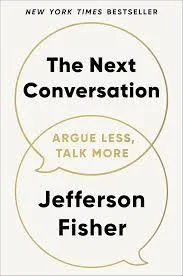Blog
Encouragement and insights for the journey ahead.
By Emily Miller
M.A. (Marriage & Family Therapy), LAC

The Next Conversation, Part One
Before You Speak: How to Prepare for Conversations That Actually Go Somewhere
Inspired by Part One of The Next Conversation by Jefferson Fisher.
Let’s be honest, we’ve all had conversations we walked into with the best intentions and walked out of feeling like we just wrestled a tornado. Whether it's with your partner, your kid, a client, or your colleague, hard conversations can unravel quickly if we’re not prepared.
That’s where Part One of The Next Conversation by Jefferson Fisher comes in. This section of his book focuses on what to do before you open your mouth—how to ground yourself so you can walk into tough conversations with clarity, calm, and confidence.
So here’s the advice, straight from the heart of this first chapter:
Calm Yourself Before You Confront Anyone
Jefferson’s Advice: If you’re emotionally heated, you’re not ready to have the conversation. Pause. Breathe. Wait.
Jefferson describes what he calls the “ignition” moment. That internal spark that gets lit when something sets us off. Before we even speak, our nervous system is already preparing for battle. Because here’s the catch: once we’re in that state, we’re not thinking clearly. We’re purely reacting.
Instead of jumping in angry, try this:
Take a “conversational breath” before saying anything. Inhale slowly, exhale even slower. This isn’t just calming, it signals to your brain that you’re safe, which makes space for thoughtful words instead of reactive ones.
Frame Before You Fire
Jefferson’s Advice: Start with why you're talking, not just what you're saying.
Most of us jump into difficult conversations without giving the other person a chance to understand where we’re coming from. This tends to put them on the defensive right away. Instead, he encourages us to frame the conversation at the beginning.
Instead of being on the defense, try this:
Begin with something like:
“I wanted to bring this up because I value our relationship.”
“This might be awkward, but I think it’s important we talk about it.”
“I’m not trying to attack—I just want us to understand each other better.”
Framing sets the tone. It tells the other person, “I’m here for connection, not combat.”
Less Is More: Practice Word Economy
Jefferson’s Advice: The more you say, the less they hear. Don’t bury your message under 1,000 words. Say less, mean more.
Ever tried to explain your point and ended up going down a rabbit hole of side tangents, over-explaining, or getting emotional halfway through? Yeah. Me too. Jefferson recommends keeping your message simple and focused. Stick to one conversation, one topic.
Instead of over explaining, try this:
If you’re tempted to bring up everything at once, don’t. Choose one thing to address. Say it clearly. Then pause and let it breathe.
My tip: If there is more you want to say, start by writing down all of your points of contention before the conversation. Pick one to start, then leave the others for following conversations. This way, you can ensure that you’ve hit all of your points and worked into it gradually, while still maintaining the concept of Less is More.
You Don’t Need to Win—You Need to Understand
Jefferson’s Advice: Conversations aren’t competitions. They’re opportunities to connect.
Jefferson reminds us that when we approach conversations like a courtroom drama, everyone loses. Instead of preparing our next rebuttal, we should be preparing to listen. The real goal is to understand the other person’s experience, even if we don’t agree with it.
Instead of trying to win, try this:
Shift from “How do I prove I’m right?” to “What might they be feeling right now?”
Then ask: “Can you help me understand what you were feeling when that happened?”
Empathy doesn’t mean giving up your voice. It means creating space for both voices to be heard.
Confidence Comes From Practice, Not Perfection
Jefferson’s Advice: You don’t have to feel confident before the conversation. You gain confidence through it.
We often wait to feel perfectly ready before having hard conversations, but Jefferson flips the script: Confidence comes from action, not avoidance. The more you show up with presence and purpose, the stronger you become.
Instead of waiting, try this:
Remind yourself, “I don’t have to have all the answers—I just have to be present.” And then go in, breathing, framing, and staying grounded.
Takeaway: The Next Conversation Starts With You
The first part of The Next Conversation is all about inner preparation—because no communication skill will matter if we’re not regulated, focused, and intentional first. Your words will only land if they’re carried by a calm nervous system and a clear mind.
So before you dive into the next difficult talk, remember:
Pause before reacting.
Frame your intentions.
Say only what needs to be said.
Lead with curiosity.
Be brave enough to begin.
You don’t need to control the outcome. You just need to control how you show up. And that part is fully in your hands.
NEXT UP:
SAY IT WITH CONTROL
Start Your Journey Today
Begin your journey towards a happier and more fulfilling life today.
This is a supervised private practice. It is owned and managed by a master’s-level, non-independent licensee under Board-approved clinical supervision pursuant to A.A.C. R4-6-211. The Board approved clinical supervisor of this practice is: Name: Nicole Schutzbank, LPC, LCAT, ATR-BC, ATCS Phone: (520) 355-0814 Email: [email protected]


